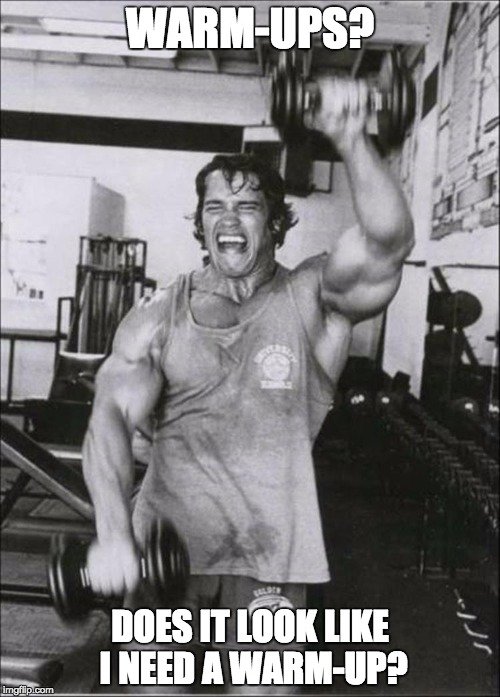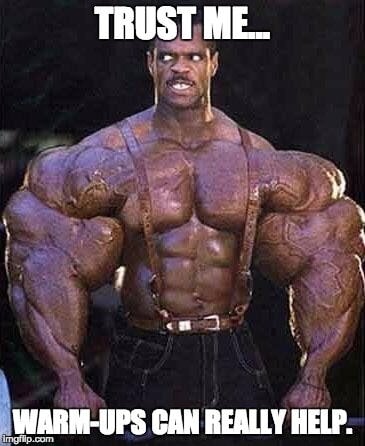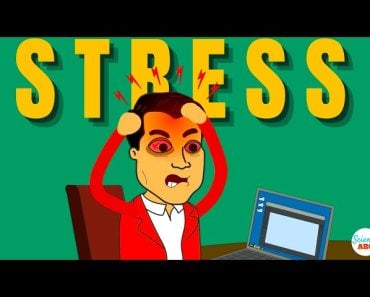Table of Contents (click to expand)
A proper warm-up will help to prepare your muscles for the physical demands of exercise, lower your risk of injury, increase your endurance, and boost the effects of the workout.
Doing a warm-up before a regular workout is an excellent way to prepare your body for the physical demands that are coming, lower your risk of injury, increase your endurance, and boost the effects of the workout, among others.
For many people, working up the motivation to go for a workout is hard enough, but there also seem to be a bunch of other elements to exercising – including stretching, warm-ups and cool-downs, not to mention the fancy workout clothes, pedometer, water bottle and other fitness gear. Of all the excess “stuff” and time that may be involved in a solid workout, you should never skip your warm-up! The question is, why is warming up our muscles so important? Aren’t we about to give them a proper workout?

Recommended Video for you:
The Science Of The Warm-Up
The term warm-up can be taken in many different ways, from briefly stretching out your legs before a job to a 15-minute informal scrimmage before the real athletic practice begins. However, the definition of a warm-up is all in the name; it is a means of warming up your muscles, reducing stiffness and preparing for the rigorous activity that is coming next.
Warming up the body typically requires movement of some kind, so a warm-up will almost always include some element of cardiovascular exercise, whether that is a short jog, high-stepping back and forth, or a few sprints. This cardio will help to get your heart rate up, delivering more oxygen to the muscles and organs, and opening up capillaries for additional blood flow.
Additionally, there should be some stretching involved in a warm-up, but many people make the mistake of only stretching and calling that a warm-up. Stretching and warming up are two very different things; the former refers to stretching the muscles, which will help prevent damage and strains, while the latter literally means warming up the body, in terms of temperature and activity level. When the body heats up, the metabolism rises and your energy levels will get a boost, helping with endurance in the workout or match ahead. Some athletes also work on basics or fundamentals during warm-ups, although few look as cool as Stephen Curry while they do it.
Some warming up will involve strength training of one kind or another, perhaps a few quick push-ups or some light reps with dumbbells, depending on what your main exercise activity will be. You want to specifically engage the parts of your body that you’re about to work out more strenuously, while also generally preparing the body for increase physical activity.
There are also some chemical and hormonal changes in the body that occur as a result of warming up, such as an increase of hormones that can regulate energy metabolism and use by the muscles. The surge of blood and available energy in the body can improve nervous system function and communication, which can improve the efficacy, impact and duration of your workout.
In terms of mental preparation, a warm-up can also help you get your “head in the game” and increase concentration. While exercising can be a relaxing activity, it also requires a certain level of focus, both in terms of paying attention to your body’s natural signals and to ensure that you are performing the workout safely and efficiently. A warm-up period of 10-20 minutes will sharpen your senses, increase blood flow to the brain, and make you more mentally prepared for what comes next.
The Dangers Of Not Warming Up
If you walk out your door first thing in the morning and start running down the street, without warming up, stretching, or mentally preparing, there is a good chance that your workout will be unsatisfying, short and potentially dangerous.
When you fail to warm up, your muscles are cold and tight, making them far more susceptible to sprains and pulls. That potential damage can be mitigated by stretching, as mentioned above. Furthermore, your cardiovascular system would be forced from a resting rate to a high-intensity exercise rate very quickly, without the chance to gradually get more active. This can be felt by the body as a “fight or flight” opportunity, which could cause a flood of stress hormones in the body, rather than a normal increase of blood flow due to the opening of capillaries.
Most importantly, your endurance will be compromised without a proper warm-up. Your body will experience a buildup of lactic acid more rapidly, causing cramps and muscle fatigue at a much quicker rate than if you had warmed up properly. By increasing the temperature of your body (and blood), your metabolism will respond accordingly, providing additional energy that you need to work out harder and longer.

The bottom line is that whether you are a once-in-a-blue moon athlete, a weekend warrior, or a gym rat with your eye on an Ironman, warming up is not just a good idea… it is an essential aspect to a healthy workout that delivers the results you want!













